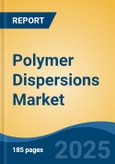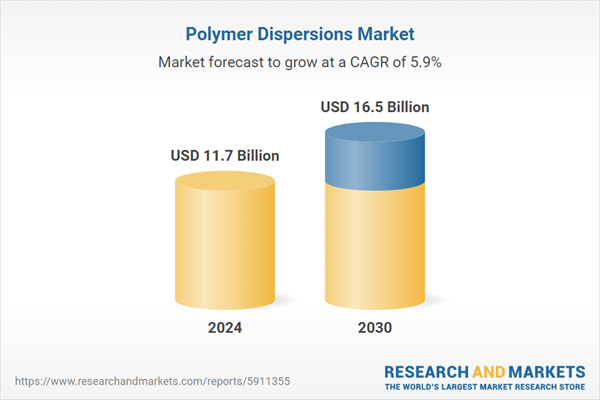Speak directly to the analyst to clarify any post sales queries you may have.
10% Free customizationThis report comes with 10% free customization, enabling you to add data that meets your specific business needs.
Market growth is driven by increasing demand from the textile and leather industries, rising construction activity, and rapid industrialization globally. Additionally, the shift toward environmentally responsible solutions, along with strict government regulations limiting VOC content, has amplified the demand for water-based, eco-friendly dispersions. As urbanization accelerates and disposable incomes rise, the adoption of polyurethane dispersions and other sustainable alternatives continues to increase, bolstered further by regulatory and consumer preference for low-emission materials. These evolving dynamics offer strong opportunities for market expansion, particularly in emerging economies.
Key Market Drivers
Shift Towards Water-Based and Eco-Friendly Solutions
The global move toward sustainable industrial practices is significantly fueling the growth of water-based polymer dispersions. This transition is closely linked to the enforcement of environmental regulations and heightened public concern over emissions from solvent-based systems. With rising levels of air pollution, especially in developing countries like India, industries are under growing pressure to adopt low-VOC materials. Between 1998 and 2021, India experienced a 67.7% increase in average annual PM2.5 levels across multiple regions, prompting tighter environmental regulations.Water-based polymer dispersions are emerging as the preferred alternative due to their reduced ecological impact and compatibility with regulatory standards. These systems are gaining traction in paints, coatings, adhesives, and construction applications, supporting both sustainability goals and functional performance requirements. Businesses are increasingly aligning with green chemistry principles, and water-based dispersions are a direct response to both environmental concerns and evolving consumer expectations.
Key Market Challenges
Volatility in Price of Raw Materials
The polymer dispersions industry relies on key raw materials such as monomers, stabilizers, and initiators, whose prices are subject to fluctuations due to geopolitical tensions, commodity price changes, and supply chain disruptions. These variations introduce cost instability in manufacturing processes and impact profit margins for producers.Passing increased costs to customers becomes particularly difficult in price-sensitive or highly competitive markets, where end-users may seek alternative products. Manufacturers are therefore challenged to maintain profitability while managing unpredictable raw material sourcing and pricing. This issue is especially prominent in sectors like construction and textiles, where price sensitivity is high and substitution risk is present.
Key Market Trends
Shift Towards Water-Based Polymer Dispersions
The market is witnessing a pronounced shift from solvent-based to water-based polymer dispersions, driven by environmental regulations and consumer preference for non-toxic alternatives. These dispersions offer desirable performance traits including strong adhesion, resistance to heat and chemicals, and UV durability - making them ideal for use in adhesives, textiles, and coatings.Governments globally have imposed strict VOC emission controls, creating further impetus for industries to adopt water-based technologies. In response, manufacturers are investing in R&D to develop high-performance, cost-effective dispersions that meet regulatory compliance without compromising quality. This shift has broadened adoption across diverse sectors, positioning water-based dispersions as a standard in sustainable product formulations.
Key Market Players
- BASF SE
- Arkema SA
- DIC Corporation
- Akzo Nobel NV
- Asahi Kasei Corporation
- Clariant AG
- Momentive Performance Materials Holdings LLC
- Nuplex Industries Ltd
- Omnova Solutions Inc.
- Wacker Chemie AG
Report Scope:
In this report, the Global Polymer Dispersions Market has been segmented into the following categories, in addition to the industry trends which have also been detailed below:Polymer Dispersions Market, By Resin Type:
- Acrylic Dispersions
- Vinyl Dispersions
- Polyurethane Dispersions
- Styrene-Butadiene Dispersions
- Others
Polymer Dispersions Market, By Application:
- Paints & Coatings
- Adhesives & Sealants
- Paper
- Textile
- Others
Polymer Dispersions Market, By Region:
- North America
- United States
- Canada
- Mexico
- Europe
- France
- United Kingdom
- Italy
- Germany
- Spain
- Asia-Pacific
- China
- India
- Japan
- Australia
- South Korea
- South America
- Brazil
- Argentina
- Colombia
- Middle East & Africa
- South Africa
- Saudi Arabia
- UAE
- Egypt
Competitive Landscape
Company Profiles: Detailed analysis of the major companies present in the Global Polymer Dispersions Market.Available Customizations:
With the given market data, the publisher offers customizations according to a company's specific needs. The following customization options are available for the report.Company Information
- Detailed analysis and profiling of additional market players (up to five).
This product will be delivered within 1-3 business days.
Table of Contents
Companies Mentioned
- BASF SE
- Arkema SA
- DIC Corporation
- Akzo Nobel NV
- Asahi Kasei Corporation
- Clariant AG
- Momentive Performance Materials Holdings LLC
- Nuplex Industries Ltd
- Omnova Solutions Inc.
- Wacker Chemie AG
Table Information
| Report Attribute | Details |
|---|---|
| No. of Pages | 185 |
| Published | July 2025 |
| Forecast Period | 2024 - 2030 |
| Estimated Market Value ( USD | $ 11.7 Billion |
| Forecasted Market Value ( USD | $ 16.5 Billion |
| Compound Annual Growth Rate | 5.8% |
| Regions Covered | Global |
| No. of Companies Mentioned | 10 |









